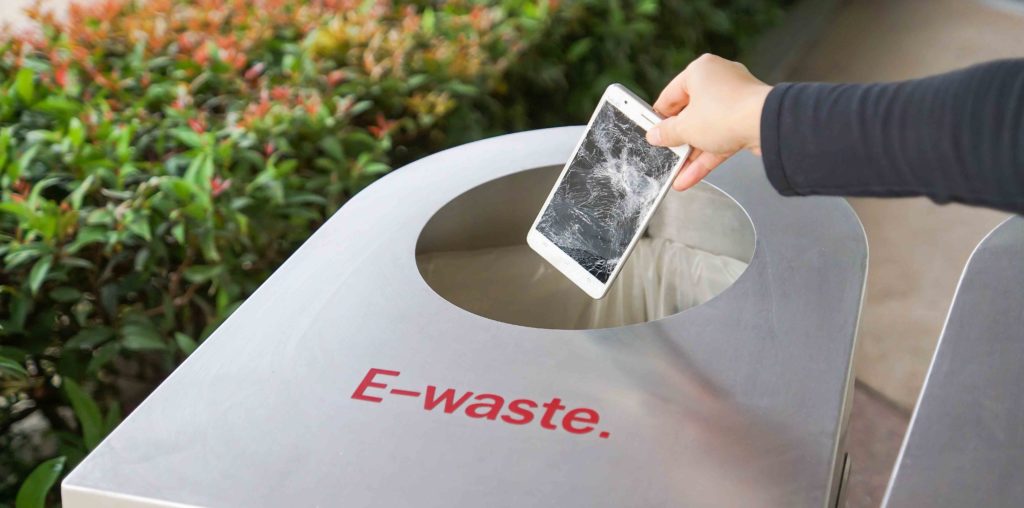As the most populous city in New England, and the 21st most populous city in the US, Boston produces a notable amount of trash. Around 1.2 million tons of trash every year, with about 75% of that ending up in landfill or incinerators. However, The City of Boston and the Massachusetts Department of Environmental Protection is now seeking to reduce this to 20% with its ‘Zero Waste Boston’ plan, aiming to move towards zero waste through planning, policy, and community engagement.
Although businesses and residents are hopeful that this sustainability initiative will increase recycling rates and proper disposal, one type of waste posing a significant hurdle to achieving that goal is electronics.
Electronic waste, otherwise known as e-waste, is one of the fastest-growing waste streams in the world thanks to our ever-growing obsession with everything electronic and digital. It is clear then, that more must be done to deal with the billions of devices that are in circulation today.
The recycling of electronics helps to conserve our planet’s natural resources and reduces the pollution and greenhouse gas emissions associated with extracting virgin materials required for manufacture. E-waste is also among the most difficult waste streams to recycle because of the hazardous materials within the devices and the complexity that comes with disassembling the products themselves.
Despite all the challenges posed by the increasingly pressing issue of e-waste, electronics recycling in Boston is on the rise. The city provides residents and businesses alike with a range of different services and facilities to best deal with e-waste in the community.
We have compiled a list of useful information on how to effectively recycle electronics in Boston.
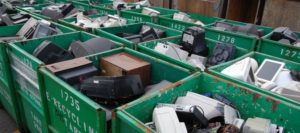
Source: mrwmd.org
Types of e-waste that can be recycled in Boston
Drop-off recycling programs and events, hosted by the City of Boston for its residents are held multiple times throughout the year. To find out more about the next Boston e-waste recycling events to be held, visit the City of Boston website.
Products included in these programs:
- Computers (including desktops, towers, laptops, and tablets)
- LCD flat panel computer monitors
- Printers (including inkjets, laserjets, copiers, and scanners)
- Networking equipment (including switches, routers, and servers)
- UPS batteries, laptop batteries, and cell phone batteries
- Audio and video equipment (including VHS players, DVD players, and stereos)
- Telephones (including cell phones and office phones)
- Other electronic accessories (including keyboards, mouse devices, cables, and wires)
Event guidelines specifically state that they do not accept the following items:
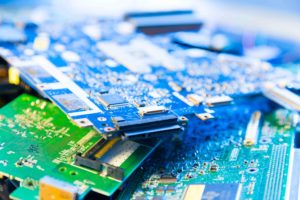
- Televisions (all types)
- CRT monitors
- Air conditioners and refrigerators
- All other appliances not mentioned already
Despite this, when we consider what facilities are available for e-waste recycling in Boston, the list of recyclable electronics can be extended into a much larger selection, including recycling services for the following.
Office:
- Copy machines
- Office/home phones and equipment
- Light bulbs
Household:
- TVs
- Microwaves
- Appliances
- Satellite receivers
- Light bulbs
Audio:
- Stereos
- Radios
- CD players
Other:
- Industrial electronic equipment
- Military equipment
- Medical equipment
- Telecommunications equipment
- Commercial equipment
- Banking equipment
- Test equipment
- All metals
Power:
- Power cables
- Batteries
- Rechargeable batteries
- Uninterruptible power supply (personal and network)
Computer:
- Mainframes
- Network cables
- Terminals
- Peripherals
- Printed circuit boards (PCBs)
- Circuit cards
- Hard drives
- Solid state drives
- Memory chips
- CD roms
- Docking stations
- Modems
- Controllers
- Switching boxes
- Network hubs
- Ink and toner cartridges
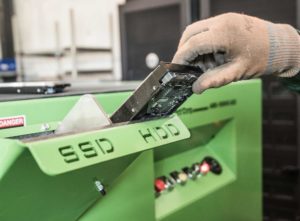
Source: pcsmass.com
How to recycle e-waste in Boston
Alternatively, you can also recycle e-waste in Boston at facilities, stores, and non-profit organizations throughout the city. Each caters to a variety of recycling needs or offers reuse programs designed to keep electronics in the loop. Before heading to any of these facilities, you should check whether the right kind of recycling solutions exist for your waste products.
Where to recycle e-waste in Boston
Whether you’re looking for somewhere to recycle some old household appliances in Boston or you’re searching for a place to dispose of different digital devices, here are some of the best-known places to do so in and around the city.
Stores and Charities
Many non-profit organizations and retail outlets will also take your old electronics; check out the following for alternative answers to the question of where to recycle e-waste in Boston.
- Best Buy
- Staples
- human-i-t
- Savers
- Goodwill
- The Salvation Army
Although each non-profit and store does accept old electronics for recycling or donation, it’s worth checking with them individually and ahead of time whether they will accept your specific items.
How else can I recycle e-waste in Boston?
Consumers and businesses who seek more information on how to recycle e-waste in Boston can also read up on the waste management hierarchy and zero-waste hierarchy. These approaches prioritize reusing and repairing electronics over recycling to keep devices in circulation for as long as possible, maximize resources used during manufacture, and reduce the burden on the recycling industry.
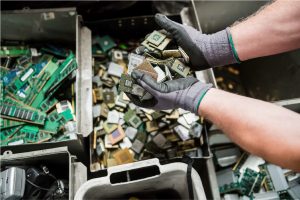
The donation and second-hand sales of unwanted electronics is the ideal choice for working devices. To ensure electronic devices remain in use, businesses and individuals can pass on older models of equipment to friends, family members, non-profits, or even other businesses. This is a great method to ensure devices are kept in use and out of the waste stream.
Repairing devices should also not be forgotten when considering how to recycle e-waste in Boston. Day to day electronic items such as smartphone batteries, screens, and computer components are just a few examples of things that can easily be replaced or repaired by consumers or businesses. For items that require more complex repairs, there are many electronics repair businesses throughout the city, such as DigiTech Electronics Solutions, who work to extend the life of all electronic devices in circulation.
What does the future hold for e-waste recycling in Boston?
Although Boston has already made its first steps towards reducing e-waste, the city still has a long way to go. The many challenges that come with effectively recycling e-waste will take dedication and education. This is particularly true as new technologies greatly increase the number of electronic devices we consume. Sustainability education at both consumer and business levels is a key component in our efforts to reduce the amount of e-waste sent to landfill.
Our team of LEED-accredited professionals offers training and education to help your business prepare for the future of electronic waste in Boston. Through the use of on-site and virtual employee training programs, RTS is able to aid your business to further your sustainability and compliance goals. For guidance on our customized services, advice on best practices for waste management and e-waste recycling in Boston, or to discuss your requirements and find out how your business can prepare for the future of recycling electronic waste, contact RTS today.
Additionally, if you’d like to learn more about recycling e-waste in our other locations within the US, please refer to our other electronics recycling guides:

